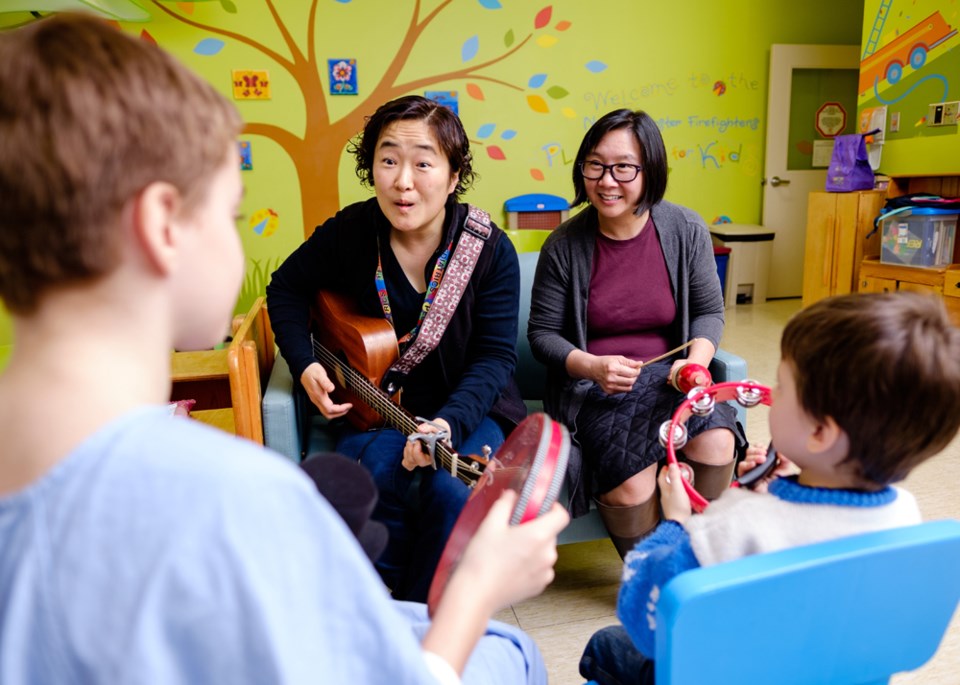A music therapy program aimed at kids who come to Royal Columbian Hospital’s pediatric unit with mental health problems seems to be making a difference, according to hospital officials.
The pediatric unit routinely tracks incidents with patients that escalate beyond nurses’ control and have to be handled with help from security.
“When a child breaks out and starts throwing things, we’ll call that an escalation,” said Joanne Shum, Fraser Health child and youth services director.
Also called code white, such incidents have gone down since November, she said, when music therapist Michelle Choi started working with kids in the unit two days a week.
That data is still coming in, Shum said, and the unit is also scrutinizing indicators for depression and anxiety, repeat admissions and patient satisfaction surveys to see what kind of difference the therapy is making and whether it’s something the hospital should continue.
But the pilot – a first for a pediatric unit in Fraser Health made possible through a $20,000 donation from Variety – seems to be having a positive impact already, Shum said.
“It’s been so great, not only for the patients, but I also notice it for our staff,” she said. “I know that a lot of our nurses have often questioned, ‘How do I get my patients engaged?’ We don’t want them to be staring at the wall all day. How do we get them to express what’s going on for them? Sometimes it’s really difficult with words, so it’s just so helpful for us to have a music therapist who’s trained and oriented in that way so we’re able to help them find a different avenue to communicate with us.”
Trunk full of music
Choi arrives at the 12-bed unit at about 3 p.m. Mondays and Fridays with a guitar and a trunk full of instruments – maracas, tambourine, xylophone, guiro (that hollow gourd with ridges that you run a stick along to make a ratchet-like sound).
The nurse tells her who is in, and Choi introduces herself around to see if any of the kids are interested in what she has to offer.
About eight out of 10 give it a try, she says, and some say no at first only to take in a session later.
“I usually demonstrate a little bit and encourage them to try it out,” Choi says. “Usually they are curious.”
She can end up working with kids anywhere from zero to 17 years old, but most of her clients are adolescents and teens, and most are facing mental health challenges, like anxiety, depression and eating disorders or the first expressions of psychiatric disorders.
One of the reasons the program is geared towards these kids is that many are waiting to get into the adolescent psychiatric unit at Surrey Memorial and their stay at RCH pediatrics is often longer than the unit average of three days.
“Mental health kids, sometimes they stay six or seven days,” Shum says, “and so it’s a challenge to keep their activity levels up but also have an ability to express themselves in a different way, so it’s important for us to prioritize those kids to get the music therapy first.”
Contrary to the stereotype of the too-cool teen, patients are more often willing to join in with Choi than not, according to Shum.
“They’re game for it,” she says. “It’s quite welcomed on the unit.”
During the sessions, which are usually one-on-one, Choi asks patients what kind of music they want to work on. She then sings it and plays it on her guitar while the kids sing and keep the beat on a percussion instrument or accompany her on a Qchord, an easy-to-play digital instrument that plays chords and rhythms.
If she doesn’t know a song, she’ll Google it, print it out and learn it with the client.
For Choi, who has spent most of her 13 years as a music therapist in care homes for seniors, it’s a big switch from ’40s favourites like the Ink Spots’ I don’t want to set the world on fire to Justin Bieber’s Love Yourself, but she’s found both sets of clients respond to the music the same way.
“They perceive music as fun and enjoyment,” she says. “They like to express feelings through music.”
And besides the music, Choi is also one of the few people kids at RCH can interact with who has nothing to do with their clinical care plan, according to Shum.
“It’s not about drawing blood,” she says. “It’s more about their emotional well-being and a way to express themselves that may be difficult to communicate with the nurses.”
Funding for the RCH pediatric music therapy pilot runs out in late spring.



